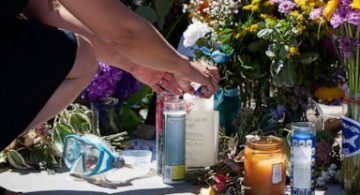A Maryland jury will soon be asked to decide if it was a crime or an accident when a fire killed a man who was helping a millionaire dig a network of tunnels for an underground nuclear bunker.
Jurors are set to hear closing arguments Tuesday in the trial of 27-year-old Daniel Beckwitt. The wealthy stock trader is charged with second-degree murder and involuntary manslaughter in the September 2017 death of 21-year-old Askia Khafra.
Beckwitt didn’t testify before prosecutors and defense lawyers finished presenting evidence from witnesses last Wednesday.
The fire erupted as Khafra was digging tunnels under Beckwitt’s home in Bethesda, a Washington suburb.
Beckwitt went to elaborate lengths to keep the project a secret. He tried to trick Khafra into thinking they were digging the tunnels in Virginia instead of Maryland by having him don “blackout glasses” before taking him on a long drive. Beckwitt also used internet “spoofing” to make it appear they were digging in Virginia.
During the trial’s opening statements, Montgomery County prosecutor Marybeth Ayres said Beckwitt sacrificed safety for secrecy and created a “death trap” in his family’s home, with mounds of trash blocking Khafra’s escape.
Hours before the fire broke out in the basement, Khafra texted Beckwitt to warn him it smelled like smoke in the tunnels. Ayres said Beckwitt didn’t respond for more than six hours before telling Khfra that there had been a “major electrical failure.” Instead of getting Khafra out of the tunnels, Beckwitt told him that he “just switched it all over to another circuit,” according to the prosecutor.
Defense attorney Robert Bonsib told jurors the fire was an accident, not a crime. Bonsib said Beckwitt screamed for help from neighbors after the fire broke out and risked his own safety in a failed attempt to rescue his friend from the blaze.
Khafra met Beckwitt online. Beckwitt had invested money in a company Khafra was trying to launch as he helped Beckwitt dig the tunnels.
Firefighters found Khafra’s charred, naked body in the basement when they entered the home. A hole in the concrete basement floor led to a shaft that dropped down 20 feet (6 meters) into tunnels that branched out roughly 200 feet (60 meters) in length.
Khafra worked in the tunnels for days at a time, eating and sleeping in there. They had lights, an air circulation system and a heater.
Bonsib said Khafra was a willing participant in the project. He showed jurors a “selfie” photograph that Khafra posted on social media, showing him in the tunnels.
Prosecutors have described Beckwitt as a skilled computer hacker who had a paranoid fixation on a possible nuclear attack by North Korea. In 2016, Beckwitt spoke at a hacker convention using the alias “3AlarmLampscooter” and wearing a fire-resistant suit and visor that obscured his face. Another prosecutor, Doug Wink, has said Beckwitt was teaching his audience how to make thermite bombs to destroy computer data “in order to get away with hacking.”





